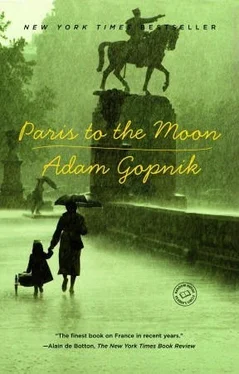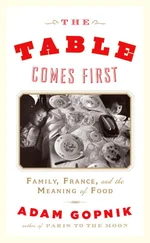By 1995 all that had changed, and Paris and France seemed left out of the new all-American dispensation. London, of all places, had become the town where people went to see new art and taste new cooking. For the first time in modern history it was actually possible to live in Paris for comfort and bourgeois security and travel to London for food and sex. (My cousin Philippe had, like so many ambitious Frenchmen of his generation, actually fled Paris for London, where he had made a small fortune in banking and was about to finance his own restaurant.)
The failure of the French model and the triumph of the Anglo-American one is by now a sorry, often repeated fact. For five years hardly anyone wrote about Paris and the French except in a tone of diagnosis: how sick they were, when they got so sick, why they denied that they were sick, and if there was any chance that they would ever get better. (No.) Many journalistic tours d’horizons have been written in the last few years—“Whither France?” and “Whether France…” and “Weathering France,” and “France: How It Withers” and “Withering France.” We surf the waves of capitalism, from crest to trough and back again, but the funny thing is that no matter how often we ride the wave, nobody notices that it’s wet. When we are on the crest, we believe that we have climbed a mountain through our own virtuous efforts, and when we are in the trough, we believe that we have fallen into a pit through our own vice.
Whatever else might be true, though, in the last five years of the century, as the world became, by popular report, more “globalized” than it had ever been before, France became more different. “They order these matters better in France,” Sterne’s opening line for his sentimental journey in France, had a new ring, now. For most of two centuries, after all, what had been so different about France was how central and cosmopolitan it was. Americans had been going to Paris for a couple of centuries to learn a universal diplomatic language and the central artistic culture and even the most influential manner of cooking. Yet in the time we were there Paris seemed to pass from the place where you learned how to do it to the place where you learned how not to do it—how not to do it in the ordinary American imperial way, the place where you learned how to do it, as the French like to say, autrement, otherly. From the kind of sympathy that labor unions get from their public to the length of time you take to eat lunch, the way it’s done in Paris now is not the way it’s done in Adelaide or Toronto or Los Angeles or Tempe or Hong Kong or any of the studs on the broad belt of the English-speaking imperium that now encircles the world, with New York as its buckle. Americans still learn about differences in Paris, but now we learn about them not because we are so much closer to the center of things but because we are so much farther away. The light of Paris still shows Americans things as they are (if not as they really are) by showing us how things can look different in a different light, but the light it shows them with now is more mysterious and singular, a kind of moral moonlight, a little bit harder to see by.
There was no big story in France at the end of the century, but there were a lot of littler ones, and the littlest ones of all seemed to say the most about what makes Paris still Paris. Princesses died and prime ministers fell and intellectuals argued, gravely, about genuinely grave questions, and I wrote about all these things, but I have left most of that writing out of this book. They are important things, but the things that interested me most, in a time of plenty, were the minute variations, what a professor would call the significant absences, between living a family life in one place and living the same kind of life somewhere else. This is a story of the private life of a lucky American family living in Paris in the last five years of the century, less a tour of any horizon than just a walk around the park. To the personal essays about life in Paris, I have added some private journals I wrote every Christmas. These journals, I see in rereading them, are more pensive and even pessimistic in tone than the stories, perhaps because they are notes sent inward rather than letters sent out. (I have also included a long report on the trial of Maurice Papon because it is about the occupation and collaboration, still the great, unignorable black hole at the center of French life, still sucking in the light even of everyday pleasure.)
Family life is by its nature cocooned, and expatriate family life doubly so. We had many friends and a few intimate ones, but it is in the nature of family rhythm—up too early, asleep too soon—to place you on a margin, and to the essential joy—just the three of us!—was added the essential loneliness, just the three of us. What I find is left, after the politics have been removed, are mostly stories about raising a kid in foreign parts. Yet since raising a kid is the one nearly universal thing people do, and since doing it in foreign parts is the one time when you get to see most clearly all the bits of doing it that aren’t universal—that are inflected and shaped by the local geography and mood and playground equipment—it is in its way, I hope, still a not entirely interior subject.
These stories are also, willy-nilly, about bringing up a kid in foreign parts in a funny time. What made the time funny was that there was as much peace and prosperity in the world as there has ever been and at the same time a lot of resentment directed at the United States, the country where the peace and prosperity, like the kid, came from, or which at least was taking credit for it. Paris, which in the first five years of the century seemed the capital of modern life, spent the last five years on the sidelines, brooding on what had happened. Our son’s first five years, and the modern century’s last five, five years to the end of the millennium and five to grade one in New York, a small subject and a large one, juxtaposed: These stories take one stretch of time and, as they used to demand in exam papers, contrast and compare.
The stories are mostly about the life spent at home and include a lot—some will think too much—about the trinity of late-century bourgeois obsessions: children and cooking and spectator sports, including the spectator sport of shopping. Yet life is mostly lived by timid bodies at home, and since we see life as deeply in our pleasures as in our pains, we see the differences in lives as deeply there too. The real differences among people shine most brightly in two bedrooms and one building, with a clock ticking, five years to find out how and why. Not just how and why and in what way Paris is different from New York, but how a North American liberal, with the normal “universalist,” antinationalist reflexes of the kind, might end up feeling about the idea of difference itself—about the existence of minute variations among peoples: which ones really matter and which ones really don’t. (By the end of the decade, a new image of Paris, as a multicultural metropolis with a thriving entrepreneurial culture, was coming into place. This existed—it always had—but it seemed a little too easily pleasing to Americans, perhaps because it was so familiar, not so different after all, and looked to America for inspiration. The young soccer players on the champion French national team carefully imitated Sammy Sosa’s finger-kissing when they scored their goals, and French rap, striking though it was, seemed more distinctive from its American sources than really different from them, in the same way that American impressionism in the nineteenth century was distinctive rather than different from its models. Anyway, while I greatly enjoyed the Sosa finger-kissing, as I enjoyed French rap, I admired even more the way that the great Zinedine Zidane, when asked about a perfect free kick he had taken, calmly said, “I am at the summit of my art.”)
Читать дальше












